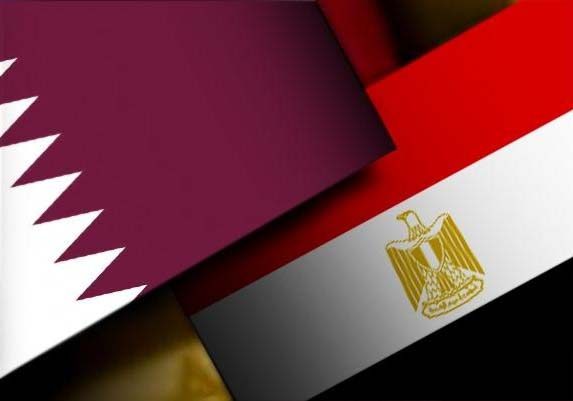
In a new diplomatic test for Qatar, Egypt’s foreign ministry has summoned the Gulf country’s chargé d’affaires to demand the return of prominent Islamic scholar Sheikh Yusuf Al Qaradawi.
The Egyptian-born cleric, who is now a Qatari citizen and has lived here for decades, is wanted for criticizing the military-backed Egyptian government, the Reuters news agency reports.
Last summer, the armed forces overthrew and imprisoned President Mohamed Mursi, and the administration it installed has since declared his political party, the Muslim Brotherhood, a terrorist organization.
Yesterday’s demand from Egypt is the latest indicator of strained ties between Doha and Cairo since Mursi was removed from power. Qatar offered significant support to Mursi’s government, but denies it has any ties with the Muslim Brotherhood itself.
Egypt last summoned Qatar’s envoy in January to formally reject comments made by the Qatari foreign ministry about its harsh tactics when dealing with protesters.
Al Jazeera under fire
Meanwhile, at least five journalists from the Qatar-funded Al Jazeera Media Network remain imprisoned in Egypt. Three Al Jazeera English journalists arrested on Dec. 29 are accused of reporting false news – apparently for interviewing Brotherhood officials.
Al Jazeera Arabic’s Abdullah Al Shami and Al Jazeera Mubashar Misr cameraman Mohammed Badr have also remained in Egyptian custody for more than five months. Badr was acquitted on charges of supporting the Muslim Brotherhood this week, but has yet to be released and was released last night.
The network has called the accusations “baseless.”
An Egyptian prosecutor last week said it would indict some 20 of the network’s reporters for aiding the Brotherhood. But the defendants have not been named, and it is unclear how many of them actually work for Al Jazeera.
As for Egypt’s call to extradite Al Qaradawi and other critics of its administration, Qatar has not yet commented publicly.
Regional upset
But the religious scholar’s comments in a Jan. 24 sermon that Saudi Arabia and UAE should stop supporting the military-backed Egyptian government have angered some in the Gulf.
Yesterday, the UAE state news agency carried remarks from the secretary general of the GCC, condemning Qaradawi’s criticism of the Emirates, and calling it an “unacceptable provocation and false allegations that only raise sedition and serve enemies of the Islamic Nation.”
Bahrain’s foreign minister Khalid bin Ahmed bin Mohammed Al Khalifa also weighed in, according to the country’s state news agency:
(Al Khalifa) called on Qatar to take a firm stance against any resident on its land who tries to defame any of the GCC member states, their leaderships and people-be it via mass media or religious platforms. He expressed confidence that Qatar will never accept any attempt to undermine solid fraternal relations between the GCC countries out of commitment to conventions signed by the GCC leaders.
Earlier in the week, the UAE’s Minister of State of Foreign Affairs called on Qatar to officially censure Al Qaradawi.
But Qatar’s foreign minister, Khalid bin Mohammad Al-Attiyah, has sought to downplay the incident, highlighting the country’s respect for the UAE and insisting over the weekend that “the only source for Qatar’s foreign policy is the official channels of the state.”
Speaking to the Al Jazeera Arabic channel on Monday night, Al-Attiyah further emphasized Qatar’s close ties with the UAE. A summary of the interview publish by the Qatar News Agency states:
HE (Dr. Khalid bin Mohammad) Al-Attiyah underlined that there are no differences with the United Arab Emirates over the situation in Egypt. He said that Qatar and the UAE enjoy very cordial relations and even share joint strategic projects. “Our communication with the UAE is excellent,” said the Foreign Minister.
The Minister said that Qatar is still supporting the Egyptian people, and does not wish any harm to Egypt.
Crown Prince of Abu Dhabi Sheikh Mohammad bin Zayed Al Nahyan has taken the same line, affirming on Twitter Monday night that “there is no dispute between us and our brothers in Qatar”:
محمد بن زايد: ليس هناك اي خلافات بين الأشقاء في الإمارات وقطر واهل قطر إخواننا ..وثقتي كبيرة بحكمة الشيخ تميم
— محمد بن زايد (@MohamedBinZayed) February 3, 2014
(rough translation: There are no differences between the UAE and Qatar and the people of Qatar are our brothers. I trust in the wisdom of Shaikh Tamim)
Meanwhile, the trial of a Qatari doctor in the UAE is being seen as one indicator of how close those ties are.
Dr. Mahmood Abdulrehman Al Jaidah stands accused of working with Al Islah, a banned political group in the UAE that has ties to the Muslim Brotherhood. Detained in the UAE since Feb. 26, 2013, a verdict in his case was expected on Monday, but after appearing in court, the decision was postponed until Mar. 3.
Al Jaidah’s supporters have said they are not optimistic about his chances because the doctor has not been given a fair trial.
Thoughts?







